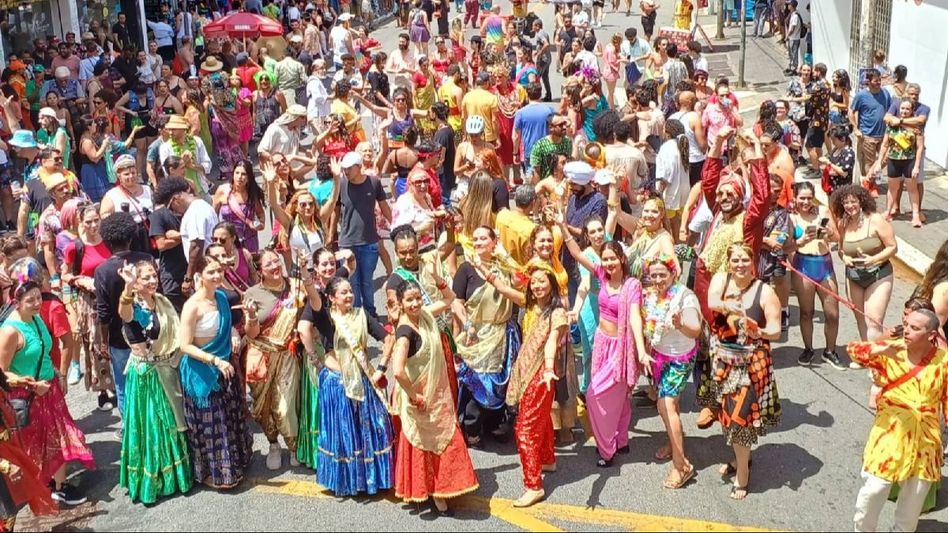Blocobollywood: Assam's Cultural Heritage Bihu showcased on the streets of Brazil
The Swami Vivekananda Cultural Centre, under the ICCR, showcased Indian folk culture at a carnival in Sao Paulo, Brazil. Despite a small Indian diaspora, thousands of spectators enjoyed and danced to Indian music.
 Swami Vivekananda Cultural Centre Showcases Indian Folk Culture at Sao Paulo Carnival
Swami Vivekananda Cultural Centre Showcases Indian Folk Culture at Sao Paulo Carnival- Swami Vivekananda Cultural Centre showcases Indian folk culture at Sao Paulo Carnival.
- Bihu and Garba performed by Brazilian dancers trained by the ICCR.
- Plans to organise an intangible heritage festival based on tribal art and traditions of Northeast India and Brazil
The Swami Vivekananda Cultural Centre, under the aegis of the Indian Council for Cultural Relations (ICCR), recently highlighted the folk culture of India at a carnival in Sao Paulo, Brazil. Ambassador Shri Suresh K Reddy inaugurated the event which usually features an effervescent display of Bollywood dances.
This year, the carnival was enhanced with the addition of Indian folk dances like Bihu and Garba, performed by Brazilian dancers trained by the ICCR. Despite a small Indian diaspora, thousands of spectators on February 10 reveled in and danced to Indian music.
Dr Jyoti Kiran Shukla, a trained economist researcher, and author, was featured at the Jaipur Literature Festival in 2014 and 2016. She emphasized the importance of oral traditions, folk culture, and other such elements. Shukla presented a feature titled 'Bahurangi Bharat', representing the diverse colors of India. It ranged from the Kalveli of Rajasthan to the Bihu of Assam, coinciding with the arrival of spring. While other dances like Bhavai and Ghoomar have been showcased before, this was the first time Bihu was performed by Brazilian dancers. The event featured approximately 6 million dancers and 7 dancers were trained in various Indian folk dances, including two surprise items - Bihu and Kalbeliya of Rajasthan.
CG Manisha Swami addressed the crowd. The event, named 'Blocobollywood', was inaugurated by Ambassador Suresh K Reddy. Dr Jyoti Kiran Shukla, Director of the Vivekanand Cultural Centre, who introduced ICCR's presentation, 'Bahurangi Bharat', discussed with IndiaTodayNE about the intangible heritage of the Northeastern region of India and Brazil.
Brazil gets a taste of Northeast India's culture with Bihu
Brazilians are connecting with Bihu, a folk festival from Northeast India, due to three main reasons. The first reason is the striking similarity between Brazilian indigenous culture and the culture of Northeast India. This similarity extends to drum styles, rhythms, collective spirit, actions, and mudras. Indian folk music, particularly from the Northeast, resonates with the indigenous music of Brazil. This has led to a newfound appreciation for Bihu on the streets of Sao Paulo, a first-time occurrence according to some. The second reason is the commonality of Bihu as a folk festival, mirroring similar celebrations in Brazil. Lastly, this is the first time a Northeastern folk dance has been presented at the Carnival, a major cultural event in Brazil. Plans are underway to organize an intangible heritage festival based on tribal art and traditions of Northeast India and Brazil.
Bihu dance form gains prominence in Brazilian Culture?
We were presenting six states over here. They're just showcasing the dance form, not the traditional attire. Right. It's a festival of the road, as you know, on the road. Therefore, when six dance forms are presented, you cannot change the dresses. There is no option. India is not just about popular music.
What pushed you to promote Indian folk dances globally?
Because of the actual depth and the listening tradition of India, it's such an intangible heritage. It is all close to the spiritualism, art, symbols, and sounds of the Indian subcontinent. Therefore, there is a large connectivity between Latin America and us which should be explored. The folk traditions are the most rich traditions, which are less exposed. So I think it becomes a priority that we expose these traditions and as a representative of ICCR, we are trying to work hard on that particular aspect.
It needs to be mentioned here that Sao Paulo is a bit exposed to Bollywood music as bloco was started here pre-pandemic by Shobhan Saxenas and Florencia Costa but little knowledge exists about folk dances, especially from the Northeast India.
*It is an independent interview, All her ideas are personal*.
Copyright©2025 Living Media India Limited. For reprint rights: Syndications Today









